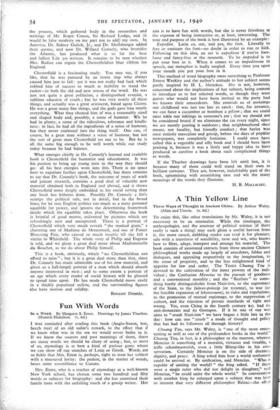Fun With Words
In a Word. By Margaret S. Ernst. Drawings by James Thurber. (Hamish Hamilton. 7s. 6d.)
I WAS reminded after reading this book (Anglo-Saxon, boc, beech tree) of an old sailor's remark, to the effect that if we knew what was in the sea we would never bathe in it. If we knew the sources and past meanings of them, there are many words we should be chary of using ; but, to most of us, etymology is at best a kind of parlour game where we can show off our snatches of Latin or Greek. Words are so fickle that Mrs. Ernst is, perhaps, right to treat her subject with a measured levity: the pedant, in the matter of words, bears some resemblance to Canute.
Mrs. Ernst, who is a teacher of etymology at a well-known New York school, has chosen some two hundred and fifty words as subjects for biography : and she has examined their family trees with the unfailing touch of a gossip writer. Her
aim is to have fun with words, but she is never frivolous at the expense of being instructive or, at least, interesting. The tone and purpose of the book is best illustrated by an example:
Expedite. Latin ex, out, and pes, the foot. Literally to free or extricate the foot—no doubt in order to run or kick. Following on this idea, an act is expedient if you're foot- loose and fancy-free at the moment. To be impeded is to put your foot in it. When it comes to an impediment in speech, our metaphor is badly tangled. Every time you open your mouth you put your foot in it.
This method of word biography owes something to Professor Ernest Weekley and the author's attitude to her subject seems partly inspired by H. L. Mencken. She is not, however, concerned about the implications of her subject, being content to introduce us to her selected words, as though they were guests who would not have been invited to the party had we known their antecedents. She reminds us of meanings our childhood was just too late to catch : that, for instance, we can farce a cucumber or bombast a pillow ; that we could once inkle our inklings in someone's ear ; that we should not be considered brutal if we eliminate the cat every night, since we are merely putting it outdoors ; that neighbourhood ohcc meant, not locality, but friendly conduct ; that harlot Was once entirely masculine and gossip, before the days of poptdar newspapers, was completely feminine. I could once have called this a vegetable and silly book and I should have hen praising it, because it was a lively and happy idea to have produced so carefree a book about such complicated things as words.
If the Thurber drawings have been left until last, it is because many of them could well stand on their own as brilliant cartoons. They are, however, indubitably part of the book, epitomising with astonishing ease and wit the many meanings of the words they illustrate.
H. B. MALLALIEU.


































 Previous page
Previous page